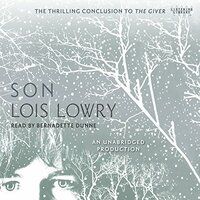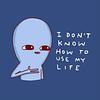Take a photo of a barcode or cover
like others, i felt super-disappointed by lowry at the end of this book. the beginning was pretty strong, and it was fascinating to see the backstory of where gabe came from. claire is a terrific character.
but, like some others have said here, the arc of the story turns on magic, which is weird for this series--i felt like the giver involved deep empathy, maybe a bit of esp, but not magic. here we end up with the plot turning on (obstacle presented by & resolved via) magic to do with pure evil. i think the line is something like, "the trademaster was not human, had never been human. he was simply evil." really? and really, just telling him (i thought he had been fairly omniscient) that his curses had failed to ruin people's lives was enough to make him melt like the wicked witch of the west. really? really???
dystopian literature doesn't need demons, lois. really.
but, like some others have said here, the arc of the story turns on magic, which is weird for this series--i felt like the giver involved deep empathy, maybe a bit of esp, but not magic. here we end up with the plot turning on (obstacle presented by & resolved via) magic to do with pure evil. i think the line is something like, "the trademaster was not human, had never been human. he was simply evil." really? and really, just telling him (i thought he had been fairly omniscient) that his curses had failed to ruin people's lives was enough to make him melt like the wicked witch of the west. really? really???
dystopian literature doesn't need demons, lois. really.
Parts of the book area good, but the end seemed very anti-climatic. It seems there should have been more to it.
"The thrilling conclusion to The Giver."
Whoever wrote this book jacket copy may want to look up the definition of thrilling. Yes, this fourth book does tie together the story strands from The Giver, Gathering Blue, and Messenger, but the connecting themes are more sweet than thrilling.
Part One: Before
Having another glimpse into The Community was pretty fascinating. After reading and teaching The Giver for years, this opening section felt like a behind-the-scenes tour. The first sentence is so promising as Claire, the birthmother, is blindfolded as she is prepared to give birth to her "Product." I got all excited thinking about the symbolism of sight and the connection to color. Unfortunately, the blindness extended to some holes in the plot.
When Claire's birth does not follow the prescribed Plan Of Action, she's hurriedly rushed into a job at the fish hatchery, where no one bothers to explain her new status in The Community. No one even notices that her Pill dosage has not been reinstated. While I understand that the circumstances of Claire's failed natural birth are rare, the Elders seem pretty OCD. They watch everything and have a polite procedure for everything. I just don't buy that the same Community that made a public announcement after Jonas took one apple from a playground about community members not hoarding food overlooked a detail like making sure Claire took her Pill every day. The Pill is potentially the most important controlling mechanism in The Community.
In any case, Claire continues to experience emotions and yearns for her baby, who we find out is little Gabriel. When Jonas leaves The Community with Gabe, Claire is right behind him.
Part Two: Between
Here Claire discovers colors and music as well as stereotyping. Ah, the beautiful elements of humanity that The Community deleted along with the uglier shades of human nature. She also trains for years to climb out of a valley by way of a hellaciously dangerous cliff.
I like the metaphor of life as a journey, but this section was too long. The training was ridiculously long. Considering how tightly written the previous three books were, I was surprised by the meandering in this section.
Part Three: Beyond
This section begins to feel more like a fantasy novel than science-fiction. Maybe magical realism? We're reintroduced to the embodiment of evil, Trademaster, and we hear about the gifts that several characters have. While the messages about good and evil are touching, this section felt disjointed and rushed to me. Jonas makes some solid arguments about how the quality of community lies within what people contribute. The book ends similarly to The Giver with an illustration of love.
However, the way Lowry reaches these messages is very hippie-dippie. I have no issue with a science-fiction novel that implies climate-control is being used, but never explains the mechanism. Emotions are being controlled? Of course, here's the Pill everyone takes every day. The population is regulated? Yes, we release as many people as we have being born every year. I've never checked the math on that one, but since Lowry didn't mention too many specific numbers in The Giver I was fine with her world. In this conclusion, though, there are too many timey-wimey plot contrivances that are set up to deliver a message.
I think The Giver stands best on its own. When my nieces and nephews are old enough to read these books, my recommendation will be to read The Giver and just enjoy the ambiguous ending. Don't try to find Elsewhere in any other books because Lowry's version of Elsewhere pales in comparison to an individual's imagination.
Whoever wrote this book jacket copy may want to look up the definition of thrilling. Yes, this fourth book does tie together the story strands from The Giver, Gathering Blue, and Messenger, but the connecting themes are more sweet than thrilling.
Part One: Before
Having another glimpse into The Community was pretty fascinating. After reading and teaching The Giver for years, this opening section felt like a behind-the-scenes tour. The first sentence is so promising as Claire, the birthmother, is blindfolded as she is prepared to give birth to her "Product." I got all excited thinking about the symbolism of sight and the connection to color. Unfortunately, the blindness extended to some holes in the plot.
When Claire's birth does not follow the prescribed Plan Of Action, she's hurriedly rushed into a job at the fish hatchery, where no one bothers to explain her new status in The Community. No one even notices that her Pill dosage has not been reinstated. While I understand that the circumstances of Claire's failed natural birth are rare, the Elders seem pretty OCD. They watch everything and have a polite procedure for everything. I just don't buy that the same Community that made a public announcement after Jonas took one apple from a playground about community members not hoarding food overlooked a detail like making sure Claire took her Pill every day. The Pill is potentially the most important controlling mechanism in The Community.
In any case, Claire continues to experience emotions and yearns for her baby, who we find out is little Gabriel. When Jonas leaves The Community with Gabe, Claire is right behind him.
Part Two: Between
Here Claire discovers colors and music as well as stereotyping. Ah, the beautiful elements of humanity that The Community deleted along with the uglier shades of human nature. She also trains for years to climb out of a valley by way of a hellaciously dangerous cliff.
I like the metaphor of life as a journey, but this section was too long. The training was ridiculously long. Considering how tightly written the previous three books were, I was surprised by the meandering in this section.
Part Three: Beyond
This section begins to feel more like a fantasy novel than science-fiction. Maybe magical realism? We're reintroduced to the embodiment of evil, Trademaster, and we hear about the gifts that several characters have. While the messages about good and evil are touching, this section felt disjointed and rushed to me. Jonas makes some solid arguments about how the quality of community lies within what people contribute. The book ends similarly to The Giver with an illustration of love.
However, the way Lowry reaches these messages is very hippie-dippie. I have no issue with a science-fiction novel that implies climate-control is being used, but never explains the mechanism. Emotions are being controlled? Of course, here's the Pill everyone takes every day. The population is regulated? Yes, we release as many people as we have being born every year. I've never checked the math on that one, but since Lowry didn't mention too many specific numbers in The Giver I was fine with her world. In this conclusion, though, there are too many timey-wimey plot contrivances that are set up to deliver a message.
I think The Giver stands best on its own. When my nieces and nephews are old enough to read these books, my recommendation will be to read The Giver and just enjoy the ambiguous ending. Don't try to find Elsewhere in any other books because Lowry's version of Elsewhere pales in comparison to an individual's imagination.
adventurous
emotional
reflective
medium-paced
The final book of The Giver quartet is broken into three parts. I love that the first part brings us back to the very beginning. It acts as a refresher to The Giver, but with a new perspective: that of Gabe’s mother, Claire. The opening was like scenes from a nightmare society. Birthmothers are nothing more than vessels, their feelings and emotions ignored, and giving birth blindfolded with a pill to follow, erasing their emotions. The second part shows us what happens to Claire in the years that follow Jonas and Gabe’s escape. I liked Claire, her gradual rebellion for the sake of her child and the strength she found while learning about herself in the world. The third and final part is the culmination of all four characters stories: Jonas, Gabe, Kira, and Claire. And, technically, Matty‘s as well. It’s so beautifully done and intertwined and has an overall theme that are unique qualities are our gifts, our power. It is human nature to want to love and be loved in return, to be cherished and wanted. This final book ties up all the loose ends and gives the conclusion to Jonas and Gabe‘s story. Plus, who doesn’t love a happy ending?
The writing is quick and easy to follow along, each character has their own distinctive voice, and there are many different lessons that can be learned. I do think that all four books need to be read to truly understand the magnitude of the series, though often The Giver is the only one most people read and/or know about. It is not a series where you can read one book as a standalone and the content from each is needed to aid in the understanding of the next. Overall, it could have been combined as one book, but it would’ve taken away from each character’s history.
The writing is quick and easy to follow along, each character has their own distinctive voice, and there are many different lessons that can be learned. I do think that all four books need to be read to truly understand the magnitude of the series, though often The Giver is the only one most people read and/or know about. It is not a series where you can read one book as a standalone and the content from each is needed to aid in the understanding of the next. Overall, it could have been combined as one book, but it would’ve taken away from each character’s history.
I really wanted to like this book. I really did. The first part of the three parts the book is broken up into is really strong, and pretty profound in a lot of ways I almost think were entirely accidental.
But the rest of the book has that same feel as Messenger, just hollow, empty, and lifeless. There's no focus on any actual theme. Trademaster could have been a really interesting character/villain, the embodiment of greed and envy and all that does to a person when they get consumed by it. But that's not actually what Trademaster is, or at least not entirely, so he's just this weird presence in the book, who popped up inexplicably near almost the end of the previous book, and only then shows up here twice, is apparently the cause of all suffering in this storyworld (I think??) and then is defeated by... something.
Maybe I will come back and revisit Part 1. Maybe I won't. But that emptiness that Messenger left me with hasn't been explained or filled with any actual meaning, and honestly the latter two books have ended up tainting Gathering Blue too. But I don't care to try and keep searching for meaning here when there seems very clearly to never have been any truly here in the first place.
But the rest of the book has that same feel as Messenger, just hollow, empty, and lifeless. There's no focus on any actual theme. Trademaster could have been a really interesting character/villain, the embodiment of greed and envy and all that does to a person when they get consumed by it. But that's not actually what Trademaster is, or at least not entirely, so he's just this weird presence in the book, who popped up inexplicably near almost the end of the previous book, and only then shows up here twice, is apparently the cause of all suffering in this storyworld (I think??) and then is defeated by... something.
Maybe I will come back and revisit Part 1. Maybe I won't. But that emptiness that Messenger left me with hasn't been explained or filled with any actual meaning, and honestly the latter two books have ended up tainting Gathering Blue too. But I don't care to try and keep searching for meaning here when there seems very clearly to never have been any truly here in the first place.
Reading the Giver as a young kid had quite literally changed my life and how I see things. And now having a final story to wrap every character and thought up is absolutely amazing. Son is breathtaking and heartbreaking. Claire's journey, Marty's legacy, Kira and Jonas truth and of course Gabriel's closure has made my heart feel warmer. Truly glad I read these books. Highly recommend.
I wanted to give this book more stars but after all of the build up it let me down. The ending felt so rushed and had none of the emotion of the rest of the book.
adventurous
emotional
reflective
medium-paced
Plot or Character Driven:
Character
Strong character development:
Yes
Loveable characters:
Yes
Diverse cast of characters:
Complicated
Flaws of characters a main focus:
Complicated
I really liked the beginning of this novel, which is the last in The Giver series, but the ending petered out for me. What was set to be a climactic ending, came out quite flat. I was hoping for a little more information on the Trademaster, a little more fleshed out exchange, and a lot more coverage on the powers that made some of the characters special. The lead up of Gabe's even more special-yet-mysterious power doesn't really go anywhere. I just wish there was more explanation of the world they live in. I can't let it slip into the background foundation of the book precisely because it is glaringly at the center of all the mystery and questions I have about it still.




